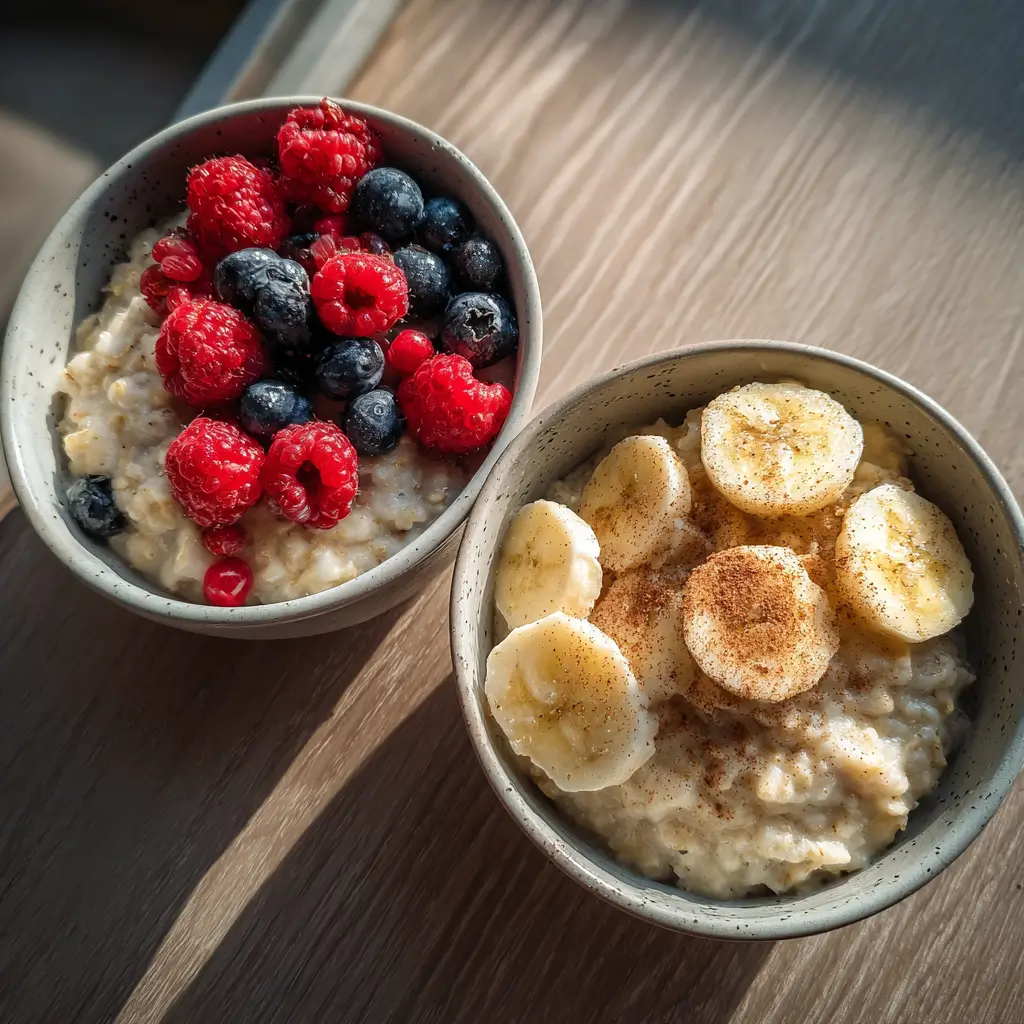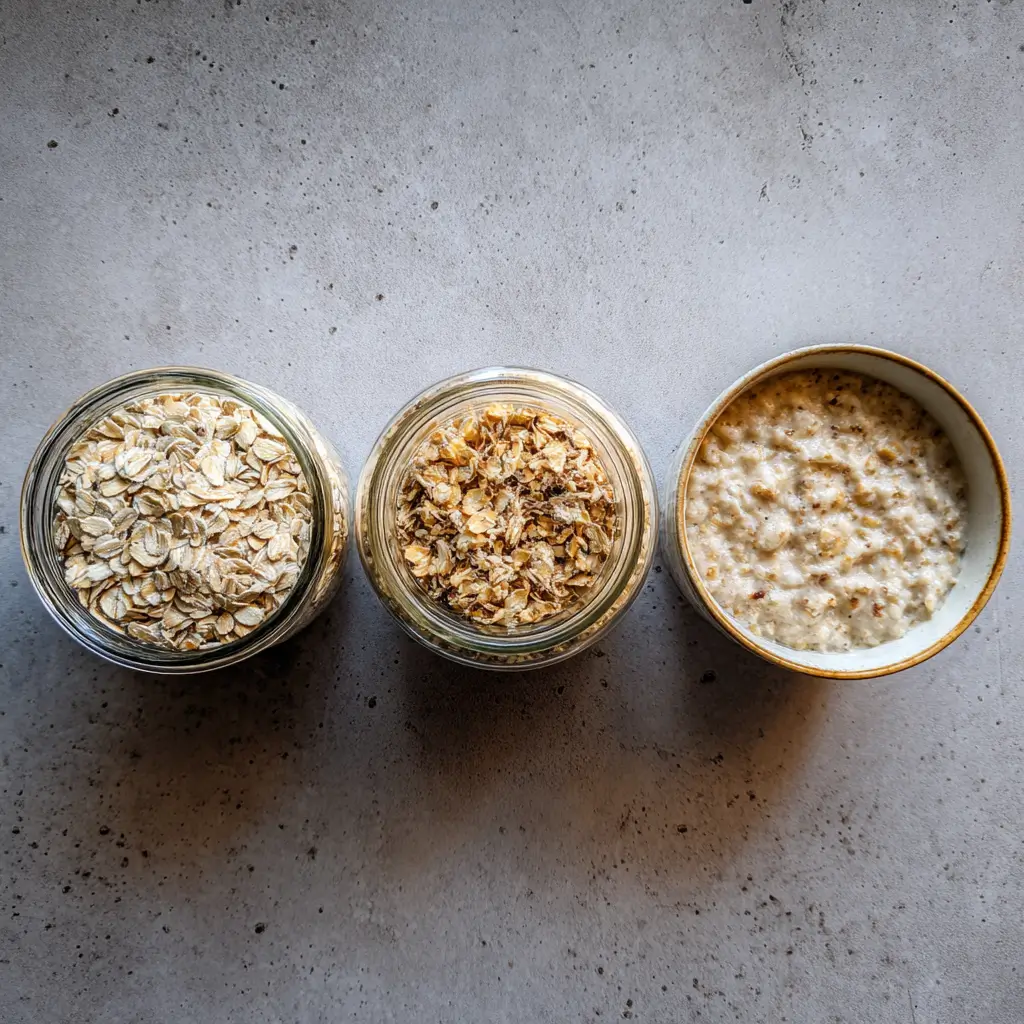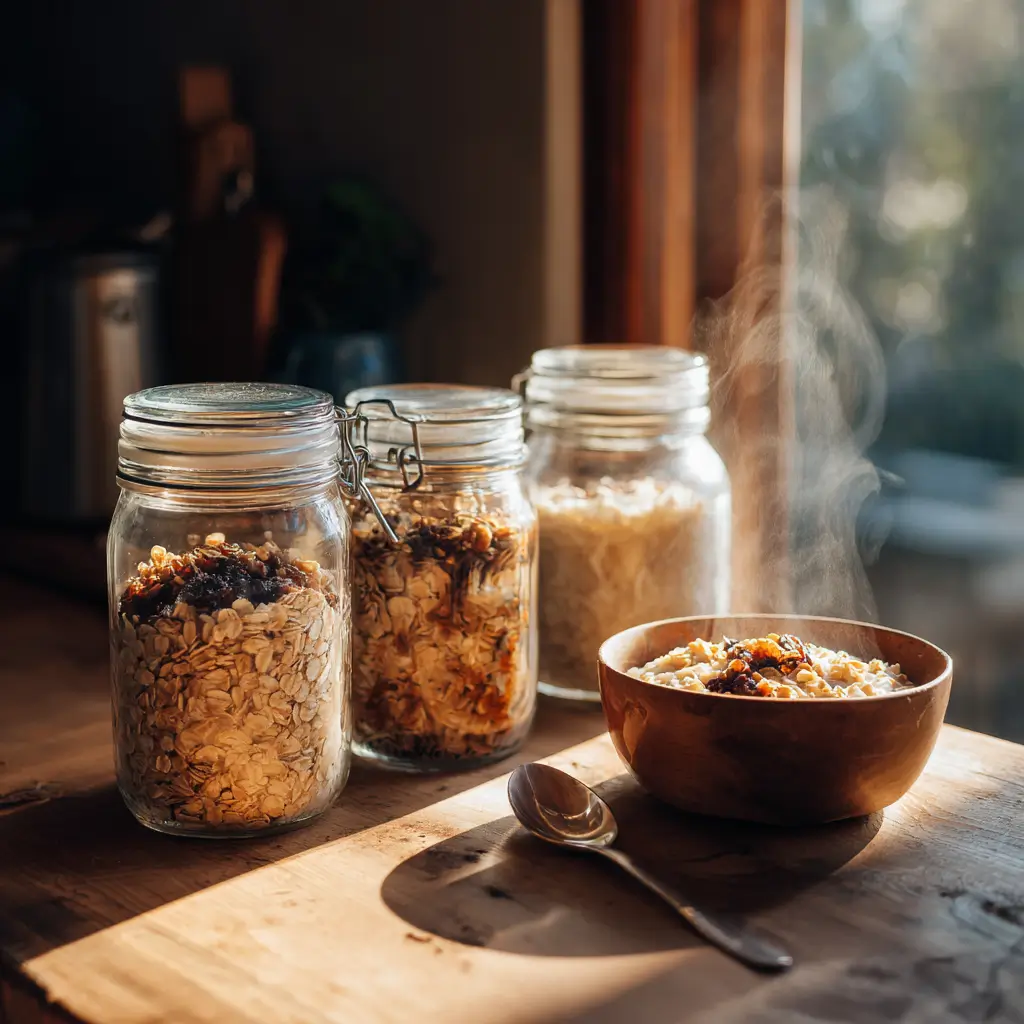Overnight oats vs oatmeal is a debate that comes up in nearly every healthy eating conversation. Both are delicious, both are packed with nutrients, and both can be customized with endless toppings. But when you look closely at overnight oats vs cooked oats, the two methods have unique advantages when it comes to nutrition, digestion, and convenience.
In this article, we’ll break down the real differences between overnight oats vs hot oatmeal nutrition, compare their glycemic index, and highlight the unique health benefits of each. By the end, you’ll know exactly which version of oats best fits your lifestyle and wellness goals.

Looking for inspiration to get started? Try our how to make overnight oats guide tonight. And for more healthy ideas, join our Facebook community or follow us on Pinterest where we share oat recipes daily.
Table of Contents
What Are Overnight Oats?
The Basics of Overnight Oats
When comparing overnight oats vs oatmeal, the main difference starts with preparation. Overnight oats don’t require cooking at all—you simply soak rolled oats in liquid (milk, yogurt, or a plant-based alternative) and let them sit in the refrigerator overnight. By morning, the oats have absorbed the liquid, becoming creamy, soft, and ready to eat.
This method gives overnight oats a distinct texture compared to hot oatmeal. They’re chewy and cool, perfect for busy mornings when you want something grab-and-go. That’s why so many people looking at overnight oats vs cooked oats choose the no-cook version for convenience.
Why Overnight Oats Are Popular
Another reason overnight oats stand out in the overnight oats vs oatmeal debate is how customizable they are. You can mix in chia seeds, nut butters, or protein powders, then top them with fresh fruit, nuts, or spices. Each jar can be unique, making them one of the most versatile breakfasts around.
And when it comes to nutrition, soaking helps preserve resistant starch and lowers the glycemic index of overnight oats compared to cooked versions. That means they digest more slowly, keeping you full and energized for longer.
Curious about the best starting point? Try our overnight oats 101 guide to master the basics.
What Are Cooked Oats?
The Basics of Cooked Oatmeal
In the overnight oats vs cooked oats comparison, cooked oatmeal is the classic method most of us know. It’s made by simmering oats in water or milk on the stovetop or heating them in the microwave until soft and creamy. The cooking process breaks down the oats more than soaking does, giving them a warm, porridge-like texture.
For many people, this is what comes to mind first in the overnight oats vs oatmeal debate—a comforting bowl of hot oats on a chilly morning. The flavor is rich, and the warmth makes it especially satisfying during colder seasons.
Why People Love Cooked Oats
One reason cooked oats hold their own in the overnight oats vs cooked oats debate is texture. While overnight oats are chewy and cool, cooked oatmeal is smooth and creamy. The cooking process also allows flavors like cinnamon, vanilla, or fruit to infuse directly into the oats, creating a deeper taste experience.
When it comes to nutrition, cooked oatmeal health benefits are impressive too. Heating makes beta-glucan fiber more soluble, which helps lower cholesterol and support heart health. So even if cooked oats score a bit higher on the glycemic index compared to overnight oats, they remain a nourishing choice.
For a cozy twist, try our banana bread overnight oats—a recipe that combines the comfort of baked oatmeal with the convenience of soaked oats.
Nutrition Showdown — Overnight Oats vs Cooked Oats
Overnight Oats Nutrition
When comparing overnight oats vs oatmeal nutrition, overnight oats often come out ahead in terms of resistant starch. Because they aren’t exposed to heat, they retain more of this special fiber that acts as a prebiotic, feeding good gut bacteria and improving digestion. Another benefit is the glycemic index of overnight oats, which is lower than that of hot oatmeal. This means overnight oats provide a slower, steadier release of energy and help keep blood sugar levels balanced.
Nutrient retention is another plus. Since overnight oats are soaked, not cooked, heat-sensitive vitamins and minerals are preserved. This makes them a favorite among those looking for maximum nutrition with minimal effort.

Cooked Oatmeal Nutrition
That said, the cooked oatmeal health benefits are impressive too. While heat reduces resistant starch, it actually enhances beta-glucan fiber, making it more soluble. This soluble fiber helps lower cholesterol and supports oats for heart health. For people with sensitive stomachs, cooking oats may also make them easier to digest compared to raw soaked oats.
So, in the overnight oats vs cooked oats debate, the nutritional winner depends on your goals. Overnight oats are excellent for blood sugar control and gut health, while cooked oatmeal shines for heart health and comfort.
For portion guidance and ideas, check out our overnight oats ratio guide—it’s the simplest way to get the perfect bowl every time.
Digestibility and Satiety
Digestibility Differences
When it comes to overnight oats vs cooked oats, digestibility is one of the most noticeable differences. Soaking oats overnight breaks down phytic acid, a natural compound that can interfere with nutrient absorption. This makes overnight oats easier to digest for many people and may help reduce bloating. They’re also rich in resistant starch, which supports gut health and adds to their unique nutritional edge.
On the other hand, cooked oatmeal is often gentler for those with sensitive stomachs. Heat softens the oats even further, making them smoother and easier to digest. That’s why some people prefer hot oats in the overnight oats vs oatmeal debate—especially if they deal with digestive issues.
Satiety and Feeling Full
Both overnight oats and cooked oats are excellent at keeping you full, thanks to their fiber content. But in the overnight oats vs cooked oats comparison, resistant starch in soaked oats gives them an added boost for satiety. This slow-digesting fiber helps regulate appetite hormones and prevents mid-morning hunger.
Cooked oats, meanwhile, have their own advantage. The warmth and creamy texture can feel more comforting and filling, especially in colder months. That sense of satisfaction is one of the most overlooked cooked oatmeal health benefits.
Want to see how to maximize fullness? Try our high-protein vegan overnight oats, which combine fiber with plant-based protein for an even more satisfying meal.
Convenience and Preparation Time
Overnight Oats for Busy Mornings
In the overnight oats vs cooked oats debate, convenience is where overnight oats truly shine. You simply mix oats with your favorite liquid and toppings, pop them in the fridge, and wake up to a ready-to-eat meal. This makes overnight oats a go-to for meal prep lovers and anyone with a busy morning schedule.
Another win is portability. Overnight oats can be stored in jars and taken on the go, making them one of the easiest breakfasts for commuters, students, or anyone short on time. That’s why so many people side with overnight oats in the overnight oats vs oatmeal conversation.
Cooked Oats for Comfort and Flexibility
Cooked oatmeal, however, requires a bit more effort. Depending on the type of oats, it can take 5–10 minutes for rolled oats or up to 40 minutes for steel-cut oats. While this extra time may not fit every morning routine, the process gives cooked oats their signature warm, creamy texture.
In short, when comparing overnight oats vs cooked oats, overnight oats are the champion of convenience, while cooked oatmeal offers the comfort of a freshly prepared, warm meal. Both have their place—it just depends on whether you value speed or ritual.
Need inspiration for make-ahead meals? Check out our meal prep overnight oats for tips on prepping a week’s worth in one go.
Taste and Texture
The Flavor of Overnight Oats
In the overnight oats vs cooked oats debate, taste and texture are a big deciding factor. Overnight oats have a cool, chewy texture with a subtle nuttiness. Since they’re soaked, not cooked, they retain more of their natural bite. Toppings like fresh fruit, nut butters, or spices layer in flavor, giving each jar a refreshing, customizable profile.
For those who enjoy variety, overnight oats are perfect. Every batch can feel different depending on your mix-ins, making them a fun choice in the overnight oats vs oatmeal discussion.

The Comfort of Cooked Oats
Cooked oatmeal delivers a very different experience. Heating oats softens them completely, creating a warm, creamy porridge that’s especially satisfying on chilly mornings. The cooking process also allows flavors—like cinnamon, apples, or vanilla—to infuse deeply, creating a richer, more comforting taste.
So when comparing overnight oats vs cooked oats, it often comes down to preference: chewy and refreshing vs soft and cozy. Both styles shine, and many oat lovers switch between them depending on the season.
For a delicious in-between, try our chocolate peanut butter overnight oats—they’re creamy, flavorful, and taste indulgent while staying nutritious.
Weight Management and Satiety
Overnight Oats and Weight Control
One of the standout advantages in the overnight oats vs cooked oats debate is satiety. Thanks to resistant starch and fiber, overnight oats digest slowly, keeping you full longer and reducing mid-morning cravings. This makes them especially useful for those focused on weight management.
Pairing overnight oats with protein-rich add-ins like Greek yogurt or chia seeds only enhances their staying power. Many people find this combination helps them eat more mindfully, supporting their overall health goals. That’s why overnight oats are often highlighted in conversations about overnight oats vs oatmeal nutrition.
Cooked Oats and Comfortful Fullness
Cooked oats can be equally supportive for weight control. The warmth and creamy texture provide a comforting sense of fullness, which may help reduce the urge to snack. One of the lesser-known cooked oatmeal health benefits is that the beta-glucan fiber becomes more soluble with heat, enhancing its ability to slow digestion and stabilize hunger.
So in the overnight oats vs cooked oats comparison, both deliver satiety—overnight oats may keep you fuller longer thanks to resistant starch, while cooked oatmeal provides comforting fullness that many find just as satisfying.
If weight management is your goal, try our high-protein overnight oats for weight loss to get the perfect balance of fiber and protein.
Versatility and Customization
Overnight Oats Flexibility
One reason overnight oats are so popular in the overnight oats vs cooked oats conversation is their endless customizability. Since they’re made ahead, you can prepare multiple jars with different flavors—berries and almond butter one day, cocoa and banana the next. Overnight oats also pair beautifully with seeds, nut butters, and protein add-ins, making them as nourishing as they are delicious.
This adaptability makes overnight oats a favorite for meal preppers, because you can easily rotate flavors while still getting consistent nutrition. It’s part of why many consider overnight oats a winner when comparing overnight oats vs oatmeal for variety.
Cooked Oats Flavor Depth
Cooked oatmeal has its own type of versatility. Because the oats are simmered, flavors like cinnamon, vanilla, or fruit infuse directly into the dish. This makes cooked oats taste richer and more comforting. From stovetop porridge to baked oatmeal casseroles, there’s no shortage of ways to enjoy them.
So in the overnight oats vs cooked oats debate, both options win for flexibility—overnight oats for grab-and-go variety, and cooked oatmeal for deep, warming flavor combinations.
If you want a fun twist, try our 3-layer overnight oats jar, which stacks flavors for a dessert-like breakfast that’s still nutrient-packed.
Environmental Impact and Cost
Eco-Friendliness of Overnight Oats
When comparing overnight oats vs cooked oats, one surprising factor is environmental impact. Overnight oats require no stove or microwave, which means less energy use. If you prep them in reusable jars, you also cut down on single-use packaging. For eco-conscious eaters, this gives overnight oats a small but meaningful edge.
Since they’re made in advance, overnight oats also help reduce food waste. You can portion your meals ahead of time, making it less likely that ingredients go unused. It’s a practical win for both health and sustainability in the overnight oats vs oatmeal discussion.

Cooked Oats: Still Budget-Friendly
Cooked oatmeal requires heat, which uses slightly more energy, but it’s still one of the most sustainable breakfasts compared to highly processed packaged foods. Both versions—overnight oats and cooked oats—are affordable, widely available, and easy to customize without breaking the bank.
So in terms of cost, there isn’t a clear winner in the overnight oats vs cooked oats debate. Both are budget-friendly whole foods that deliver big nutrition for a small price.
For more affordable inspiration, check out our quick overnight oats recipe that proves healthy eating doesn’t have to be expensive or time-consuming.
Final Verdict — Overnight Oats vs Cooked Oats
Which Is Healthier Overall?
So, in the overnight oats vs cooked oats debate, which comes out on top? The truth is that both options are healthy, and the “winner” depends on your goals.
If you want more resistant starch, a lower glycemic impact, and easy grab-and-go prep, overnight oats are the clear choice. They’re especially helpful for people focused on gut health, steady energy, and meal prep convenience.
If your priority is comfort, warmth, and heart health, cooked oats have the edge. The cooked oatmeal health benefits from soluble beta-glucan fiber make them excellent for lowering cholesterol and supporting cardiovascular health.
Finding Your Balance
The beauty of overnight oats vs oatmeal is that you don’t have to choose just one. Many oat lovers enjoy overnight oats in the summer for their refreshing chew and switch to hot oatmeal in the winter for cozy comfort. Both deliver fiber, vitamins, minerals, and long-lasting satiety.
So the real verdict? Mix it up! By enjoying both styles, you’ll get the best of what oats have to offer year-round.
If you’re curious about experimenting, try our sous vide overnight oatmeal for a fun method that blends the best of both worlds.
FAQs About Overnight Oats vs Cooked Oats
Are overnight oats healthier than cooked oats?
It depends on what you’re looking for. In the overnight oats vs cooked oats debate, overnight oats have more resistant starch and a lower glycemic index, which makes them great for gut health and steady energy. Cooked oats, however, release more soluble beta-glucan fiber, which supports heart health.
Are raw oats as healthy as cooked oats?
Raw oats, like the ones used in overnight oats, are safe to eat once they’ve been soaked. They’re higher in resistant starch and retain more vitamins since they aren’t heated. Cooked oats, on the other hand, offer the comfort of warmth and maximize the cooked oatmeal health benefits linked to heart health.
What is the healthiest form of oats to eat?
There’s no single “healthiest” version—it depends on your needs. If you want lower blood sugar impact, overnight oats vs oatmeal nutrition shows soaked oats have the edge. If your goal is cholesterol management, hot oatmeal is a better fit.
Are overnight oats better than baked oats?
In the overnight oats vs oatmeal debate, baked oats are another option to consider. They’re warm, satisfying, and feel like a treat, but they don’t have as much resistant starch as overnight oats. If digestion and gut health are your focus, overnight oats come out ahead.
Conclusion: Overnight Oats vs Cooked Oats — The Takeaway
When it comes to overnight oats vs cooked oats, both are excellent choices for a healthy breakfast. Overnight oats shine if you’re looking for convenience, a lower glycemic index, and resistant starch that supports digestion and gut health. On the other hand, the cooked oatmeal health benefits are hard to ignore—especially for heart health, since heating makes beta-glucan fiber more soluble and effective at lowering cholesterol.
So, are overnight oats healthier than oatmeal? The real answer is balance. In the overnight oats vs oatmeal debate, each style offers unique benefits. Overnight oats are great for busy mornings and gut health, while hot oatmeal delivers comfort and cardiovascular support.
The best approach? Enjoy both. Alternate between overnight oats in warmer months and cooked oatmeal in cooler seasons, and you’ll get the full spectrum of nutrition and satisfaction oats have to offer.
For more oat inspiration, don’t miss our overnight oats mistakes guide so you can avoid common pitfalls and enjoy every bowl to the fullest.
